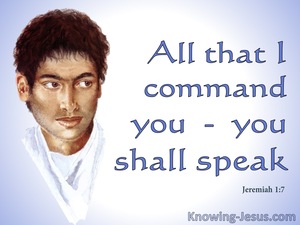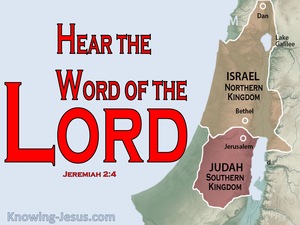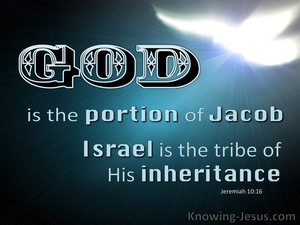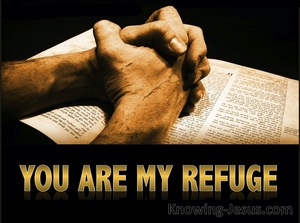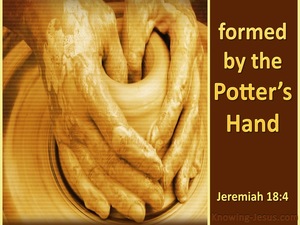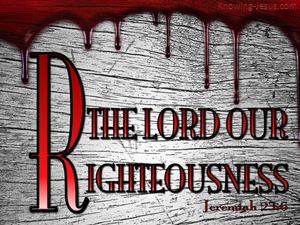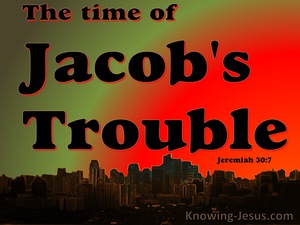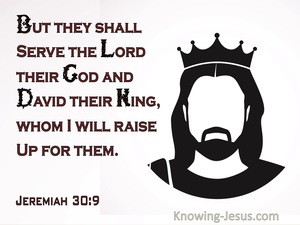◄ Jeremiah Devotional Commentary ►
Jeremiah 1:5
Jeremiah was a man who was born into the priestly line of Levi and was called to be a prophet of the Lord. He was a man who would have to endure much hardship during his life, and he even witnessed the shocking ransacking of his beloved city of Jerusalem by the Babylonians, and wept as he watched the destruction of the Temple of God, when his people were taken into captivity.
It is likely that Jeremiah was about 20 years old when read more...
Jeremiah 1:7
Jeremiah had been set apart for the Lord, from his conception. His prophetic ministry was not only to Judah, but he became God's spokesman to Gentiles and worldly kingdoms as well.
He felt ill-prepared for such a responsible role, and argued that both his young age and his lack of good oratory skills, disqualified him from this tremendous task: "Ah Lord God!" he bewailed, "Behold, I do not know how to speak, for I am only a read more...
Jeremiah 1:8
Jeremiah lived in the midst of a world at war. The northern kingdom had been enslaved by Assyria, and the kingdom of Judah had fallen into gross apostasy which would shortly result in divine punishment: the Babylonian exile. The Times of the Gentiles began with this invasion into the beautiful land by Nebuchadnezzar. His invasion also was the starting point of Israel's prolonged, worldwide dispersion, which continues to this day.
read more...
Jeremiah 2:4
The Lord chose the tribes of Israel and the house of Jacob to be His own special people, and He made a conditional covenant with them on Mount Sinai. They were sanctified to the Lord and became His consecrated people. The nation of Israel was set apart as God's portion, not only collectively but individually. Each generation was to be holy unto the Lord. Each person was to hear and obey the holy law of the Lord God of Israel.
The read more...
Jeremiah 6:16
Following his calling and commission by God, the first few chapters of Jeremiah's public ministry is a long, prophetic sermon that remonstrates against Judah's wilful apostasy. It is a denunciation of the gross infidelity of the people and their apostate priests, corrupt rulers, and lying prophets.
The glory of Israel's past had become eclipsed by their deliberate wantonness, and Jeremiah cried out for the nation to repent. He read more...
Jeremiah 8:22
Jeremiah is known as the 'weeping prophet' for he mourned over Judah's shocking spiritual condition and the gross apostasy into which they had fallen. They had rejected the principles and practice that had been delivered to them from God. They had turned to the hypocritical religious practices of the surrounding pagan nations, integrating false gods and evil worship into the heart of their religion.
Jeremiah knew that Judah needed read more...
Jeremiah 9:5
Jeremiah's public ministry of calling the nation of Israel to repent of their sin and turn from their hypocritical religiosity, was treated with indifference and contempt by his fellow-countrymen, causing this man of God deep distress. The unresponsive attitude of the people and their indifference to sin gave rise to his great lamentation, recorded in Jeremiah, chapter 9.
Jeremiah faithfully issued many general prophecies of read more...
Jeremiah 10:10
The sovereignty of God cannot be compared with anything that is in the heavens above or in the earth beneath or in the waters under the earth, for God alone is the uncreated, eternal, sovereign God of the universe.
His perfect plan for mankind, for the earth and all that is in it, and for the heavens above, is unfolding, day by day. On the earth, evil is abounding, nations are raging against God and against each other. The days read more...
Jeremiah 10:16
Jeremiah is often known as the weeping prophet who mourned over the shocking way that Israel turned from the true and living God, the Maker of all. They had turned from the God of their fathers to lifeless idols and false gods. And so Jeremiah lamented that Judah had become so disobedient that they had broken the covenant which they made with the Lord at Sinai. He wept as he prophesied of their downfall, knowing that God's chosen nation had favoured death over read more...
Jeremiah 10:23
Jeremiah foretold the dispersion of Israel and witnessed the terrible destruction of the temple and devastation of his beloved city of Jerusalem. He understood that God's people had no excuse for sin nor did their privileged status as God's chosen people exempt them from His rod of correction. And though he lamented the forthcoming judgement, Jeremiah prayed for God's mercy upon his people.
The Old Testament records Israel's read more...
Jeremiah 15:16
The Word of the Lord is pure and righteous altogether, and the Word of the Lord stands fast for ever and ever. We are exhorted to hear and preach the Word, to obey and meditate on the Word of God, and to read, mark, learn and inwardly digest its many truths if we are to show ourselves approved unto God. We are called to be doers of the Word and not hearers only, and we are to trust in its precepts and promises and not to despise or hold lightly the living word of read more...
Jeremiah 17:5
God is holy and He cannot look upon sin, while man is a sinner who has a sin nature which is always and forever at enmity with God. This state of affairs causes a total and eternal separation to exist between God and man - and between man and God.
When Adam sinned, he and all his progeny were cursed, causing man to become self-dependent instead of remaining God-dependent. Men's hearts were turned away from the Lord and read more...
Jeremiah 17:7
What tremendous benefits are discovered for the one that trusts the Lord with all their heart and does not lean upon their own understanding. Trusting in the Lord is simply believing what God has said. It is having faith in the incarnate Word of God and trusting all that the Lord has revealed to us in the written Word of God.
The man who trusts in the Lord is simply believing Him in all things; believing His Word, trusting read more...
Jeremiah 17:8
Jeremiah was known as the weeping prophet for he not only warned Israel that disobedience towards the Lord would result in their dispersion amongst the nations, but he was also one who warned of Judah's final downfall and witnessed its devastating destruction. He wept bitterly as he watched the Presence of God withdraw from the Temple of the Lord.
Like her sister Israel, Judah had also fallen into deep idolatry, which resulted read more...
Jeremiah 17:9
From start to finish, the Bible outlines God's plan of salvation for all mankind. Centuries before the birth of Christ, Jeremiah (the weeping prophet) foresaw that the Gentiles would one day turn from idols to God during a time when His chosen people, Israel, would be set aside for a season due to their ongoing, spiritual idolatry.
Like us, Jeremiah could not understand why wickedness waxed worse and worse in the world. read more...
Jeremiah 17:10
Jeremiah was not only described as the weeping prophet because he lamented when he witnessed Israel's captivity, the burning of Jerusalem, and the destruction of the Temple of God, but he is also identified as a solitary prophet. The Lord even forbade this man of God to have a wife, as a sign of the imminent disaster that was about to befall the nation.
Jeremiah's prophetic voice and his God-ordained ministry was rejected by read more...
Jeremiah 17:14
Jeremiah was a sensitive man who wore his heart on his sleeve. He had been divinely called to denounce Israel's spiritual apostasy and proclaim severe judgement upon them. They had gone astray and had willingly become embroiled in the practices and perversions of their pagan neighbours.
Jeremiah knew he had been called to preach a tough message. He was scorned by the leaders and rejected by the people. He knew the read more...
Jeremiah 17:17
The nation who follows the Lord is a blessed nation indeed, but the Lord God will lift His hand of protection and even send judgments on a nation that turns its back on God or openly defies His Word. Ancient Israel is such an example of a nation that denounced their God, and although individuals like Jeremiah within that nation chose to trust in the Lord, inevitable judgement came to Israel because they had openly defied their God.
read more...
Jeremiah 18:4
Jeremiah was facing difficult times, and the Lord wanted to teach him a special lesson so that He could understand why such hard times were coming upon the nation of Israel. So He sent Jeremiah to the house of the potter, where Jeremiah started to understand God's truths. Jeremiah saw the skill and wisdom of the potter as he formed and fashioned a pot on his turning wheel, and as he fired and baked the pot in the furnace of fire.
read more...
Jeremiah 23:6
There is only ONE that is good, and that is God. And those that are saved by the blood of the Lamb, are imputed with His righteousness. For we are covered in Christ, our true and living God, for He alone is: "The LORD Our Righteousness."
Christians have been made the righteousness of God in Christ by believing on the Lord Jesus Christ for salvation, and during the Church age there is a remnant of Israel that are read more...
Jeremiah 29:11
Jeremiah warned Israel to stop their idol worship which had replaced their devotion to God. He demanded the destruction of the pagan gods they hold dear and every false deity in which they trusted. BUT GOD Who is loving, gracious, long-suffering, and faithful, pronounced His bitter rod of severe chastening due to their apostasy, which would also prove to be a blossoming staff of sweet comfort and peace, grace and mercy, love, and hope, and joy.
read more...
Jeremiah 29:13
The promises of God pepper the pages of Scripture like crystal droplets of sparkling rain, sprinkling life into a dry and dusty desert and scattering hope into the hearts of all God's people. The promises of God tumble and glimmer through the Word of God like a myriad of twinkling stars, peeping through the glowering skies of doubt and sorrow; refreshing the soul, giving hope to the faint-hearted, and providing encouragement to the weary.
read more...
Jeremiah 30:7
A day is coming when the nation of Israel along with the whole world, will have to go through a terrible period of Tribulation that is unparalleled in human history. It will be an awful day of unprecedented distress, slaughter, fear, and trembling and it is called, "the time of Jacob's trouble." No other time will be like it - HOWEVER, Israel will be saved out of it. But why? Why does Israel specifically have to go read more...
Jeremiah 30:9
For three glorious chapters, Jeremiah the prophet, who mourned deeply for the destruction of the Holy City, writes of Israel's eventual deliverance from their enemies. He speaks of a glorious future that God has prepared for those that love Him.
The Lord knows the plans he has for His chosen people, Israel, and they are plans for good and not for evil. They are plans to give them a future and great hope. And in the midst of this read more...
Jeremiah 31:3
This beautiful passage, which is directed towards the people of Israel, announces, in tender language, that God has loved them with an everlasting love. It states that the Lord will certainly fulfil His pledge to re-gather His chosen people back into their own land. It is a reminder that He drew them to Himself in love and His love for them is everlasting. It gives them confidence that He will fulfil the promises He made to their forefather Abraham and His seed read more...
Jeremiah 31:15
Jeremiah's prophetic ministry lasted for about fifty years. He was called by God to expose the nation's sin and to warn them of God's impending punishment for their gross apostasy, their captivity into Babylon, and their inevitable dispersion. But Jeremiah's warnings of holy discipline went unheeded by the vast majority.
Jeremiah started to read more...
Jeremiah 31:31
Jeremiah was the prophet who wept when he witnessed the downfall of Jerusalem and the destruction of the temple. Warnings of apostasy flow through his writings, and he is the one who labelled the Great Tribulation as 'the Time of Jacob's trouble.'
He was also one of many prophets who spoke of Israel's restoration to the land. He prophesied that the captives of his people would be regathered back to their homeland. He spoke of the read more...
Jeremiah 32:17
Jeremiah is often known as 'the weeping prophet', for not only did he weep as he witnessed the destruction of Jerusalem and the burning of the Temple of God by the Babylonians, but he had to endure drought, imprisonment, emotional trauma, and he was even forbidden by the Lord to get married. Jeremiah's entire, prophetic ministry to Israel fell on deaf ears, as he warned them of the severe judgements to come if they did not repent of their apostate ways and read more...
Jeremiah 33:3
Right in the centre of Jeremiah, is a passage which prophesies of peace, prosperity, comfort, and hope for the kingdoms of Israel and Judah. National restoration, universal redemption, and the spiritual healing of both the northern and southern kingdoms are the key elements, while echoes of God's judgement on the wicked precede and follow this message of hope for Israel.
Jeremiah spent most of his life warning his people of read more...
Jeremiah 33:15
Jeremiah's clarion call to Judah was to repent of their sin and return to the Lord. The kingdom of Israel had been taken into slavery by the Assyrian nation, and the kingdom of Judah was following in the footsteps of her apostate 'sister'. Much of Jeremiah's ministry was calling the nation to repent of their sin, warning of Judah's inevitable defeat at the hands of Nebuchadnezzar, and reporting on the devastating destruction of the holy city and sanctuary, while read more...
Jeremiah 33:16
While the covenant given to Abraham was unconditional, the covenant God made with the children of Israel was conditional. It was dependent on the people obeying the Law given to Moses. God promised them astonishing material blessings if they were obedient to His Word, but severe punishment would result if they were rebellious. For many centuries, Israel broke their covenant with the Lord, Who graciously raised up numerous prophetic voices to warn them of impending read more...
Jeremiah 42:3
The people of Israel were in a precarious position, with anarchy within the camp and enemies on every side. And so they pleaded with Jeremiah to pray to the Lord on their behalf: "Pray that the LORD your God will tell us the way we should go," was their earnest plea, "and pray that He will tell us the thing that we should do."
Prayer is a direct line into the throne-room of God, and how often when we face the read more...
Jeremiah 50:6
From Abel to Abraham, from Moses to David, and from Amos to those men in the fields of Bethlehem who were keeping watch over their flocks by night, we see God using shepherds as an illustration of His loving-care for the needs of His people Whom He describes as little lambs and wandering sheep - lambs and sheep who have been led astray by false, destructive, and idle shepherds.
He also uses the lowly shepherd as a beautiful read more...

